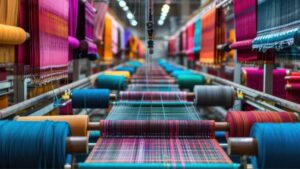 Facing the heat of tough market conditions, losing control over vendors and business, merchant exporters are increasingly finding it very hard to survive. Ironically going in for own manufacturing, according to most, is not a solution as it is not easy to run a manufacturing unit, and with many existing manufacturers struggling, the motivation is low. As prices get sharper, buyers want lesser layers in the supply chain posing a threat to the future of merchant exporters. The prevalence of merchant exporters is much higher in the home furnishing segment as compared to the apparel segment and this is mostly because of the nature and diversity of products. While many of the merchant exporters are barely managing to survive, few continue to grow with their strengths like healthy cash flow, strong relation with buyers, constantly offering new products, and lesser margins.
Facing the heat of tough market conditions, losing control over vendors and business, merchant exporters are increasingly finding it very hard to survive. Ironically going in for own manufacturing, according to most, is not a solution as it is not easy to run a manufacturing unit, and with many existing manufacturers struggling, the motivation is low. As prices get sharper, buyers want lesser layers in the supply chain posing a threat to the future of merchant exporters. The prevalence of merchant exporters is much higher in the home furnishing segment as compared to the apparel segment and this is mostly because of the nature and diversity of products. While many of the merchant exporters are barely managing to survive, few continue to grow with their strengths like healthy cash flow, strong relation with buyers, constantly offering new products, and lesser margins.
Among the strong merchant exporters in home furnishing, Adhir Kishore, CEO, Aquarian International Organization, Delhi deals mainly in bed sheets for the US market and is sourcing these from vendors in Surat. According to him, “Competitiveness and individual relation with buyers is the main thing that helps merchant exporters to survive, even in today’s tough time. If a company is financially strong, it can easily support a manufacturer and get the required products at very reasonable rates. Nowadays market revolves around cash circulation and we manage it well. However, having a strong financial backup is of no use if one is not in the good books of his buyers, so most of the things depend on the relation that a company has with its buyer.” Aquarian International had closed down its manufacturing a decade ago, as it found greater flexibility and growth in being a merchant exporter, but now Adhir is planning to come back into the textile industry in a big way next year as he expects that next year market may be more positive and also because buyers are more particular to work with companies having in-house manufacturing to better control not only quality but also compliance issues.

Increased prices and competitiveness across the globe has forced the merchant exporter to play on lesser margins. Majority of the merchant exporters accept that their profits have been reduced drastically and continuous pressure to reduce price is something that has no solution. “Depending on product and volume, many times we have delivered orders only for drawback duties, without earning even a single per cent of profit from the transaction, so one can understand the scenario,” says a dejected Xavier Jayachandran, CEO of Rock Impex, Madurai exporting wide range of home textile products and fabrics to many countries. For survival, the company is continuously exploring new products from various regions and approaches its buyers with these products in the hope of catching their attention. “Though we never restricted ourselves on product offerings, in recent years we have increased our focus on developing and unearthing unique home décor and interior products to stay relevant, but it is not a foolproof solution as all depends on buyer’s requirement. Approaching new buyers as much as possible is the only way to expand business and this is very difficult, but we have to do it,” says Xavier.
“As a solution, I would like to say that merchant exporters should develop a strong relation with manufacturers also. For that they should try to book at least 40 to 50 per cent capacity of a particular factory. In such a case they would be able to develop the factory for social audit also which is a big issue nowadays, and it will be more difficult for merchant exporters to survive without it in the long run. Financial support to the manufacturers by merchant exporters is also something that is required.” – Aristide Samuel, Director, Find Agencies, Noida, a Buying office specializing in Home Segment
While continuing to run business at all costs is acceptable to some, there are few who feel that rather than accepting non-profitable and difficult orders, declining a buyer is a better option. “Recently I had an order of few thousand bed sheets but we refused because the buyer was offering a margin of only 2 to 3 per cent, and doing it in an organized way with fully compliant factories was not a viable option. These types of orders are spoiling the market and by accepting them we are giving in to the buyers who will now push us for nil margins,” reasons a Mumbai-based merchant exporter who normally prefers to work on 8 to 10 per cent margins. Mumbai is home to many merchant exporters and many of them started their business with manufacturing, later shifting to sourcing and buyer handling. The only real difference between a buying agent and a merchant exporter is that the eventual products sourced under its supervision is exported in the name of the company and not by the company which manufacturers the product.
However, taking complete responsibility of an order not directly manufactured by the company, but exported in its name has many drawbacks and a higher risk quotient. “We asked for a container of towels from a well known towel manufacturer of Panipat but we got it 2 months late, and since the buyer refused to accept we had no option as to where and how to use it and were totally helpless in this condition,” shares Himanshu Maheshwari, MD, Karina International, which is a combination of manufacturing and merchant exports, while the garment segment is mostly direct manufacturing, home segment is largely outsourced. Committing to variety under one roof requires in-depth knowledge about that product and the manufacturers of the same, which is not commonly available, because updates about such products is not an easy job. Those who are able to keep an intense watch get benefited.
Timely delivery is among the biggest issues which is spoiling the game for merchant exporters and even forcing them towards manufacturing. Though such examples are not many but are interesting. Sunil Mishra of Stallion Home Fashion, Panipat started his business 8 years ago as a merchant exporter but it was delivery issues that compelled him to start his own manufacturing 4 years ago. “Advantages like variety of products, which a merchant exporter has, can still be enjoyed as even after having own manufacturing of core products one can outsource products that are not so common. Trading of some products and manufacturing of core products is the best option,” says Sunil.






